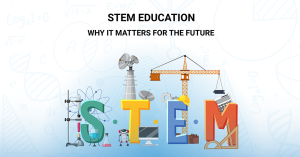
What Is STEM Education and Why
We live in a fast-paced high-tech world that demands greater...
Read MoreWe live in a fast-paced high-tech world that demands greater...
Read MoreIn today’s tech-driven world, coding alone is not enough—students need...
Read MoreLearn about the top 5 must-try wind tunnel experiments for...
Read MoreLearn how Bernoulli's principle is applied in Venturi meters to...
Read MoreLearn why incorporating drone-based cybersecurity training into university curriculums is...
Read MoreLearn how drones are being used in cybersecurity education to...
Read MoreThe FM24 Bernoulli Demonstrator is a must-have piece of engineering...
Read MoreLearn about innovative approaches to fluid mechanics labs that make...
Read MoreExplore the benefits of cybersecurity certifications for MENA universities. Learn...
Read MoreLearn why cybersecurity certifications are crucial for transitioning from the...
Read MoreThe idea that rapid technological progress could one day overtake...
Read MoreNo matter what age you are, thinking about outer space...
Read MoreWith IoT, AI, machine learning and other highly technical terms...
Read MoreOn March 22nd this year, the Orbital ATK Cygnus spacecraft...
Read MoreThe traffic of tomorrow will be emission-free, flexible, and resource-saving....
Read MoreUsing Blockchain for notary services will become mainstream in the...
Read MoreAdvance Manufacturing Technology Labs The manufacturing industry is constantly evolving...
Read MoreIndustry 4.0: How Universities can shape a newly skilled workforce...
Read MoreTechnology Education has been undergoing rapid evolution over the last...
Read MoreA better future needs better leaders. Today, students aren’t just...
Read MoreOne of the things that make renewable energy so attractive...
Read MoreIn an ideal education scenario, it is important for teachers...
Read MoreSTEM (science, technology, engineering, and mathematics) fields have traditionally been...
Read MoreEducation is a powerful tool for shaping the future, but...
Read MoreAs 3D printing technology continues to evolve, more and more...
Read MoreThe field of artificial intelligence (AI) is rapidly advancing, and...
Read MoreScience is a fundamental subject that helps students understand the...
Read MoreAs the adoption of automation and robotics continues globally at...
Read MoreAs technology evolves at a fast pace, the demand for...
Read MoreWelcome to our thrilling world of 3D printing adventure! In...
Read MoreImagine a world where your ideas in robotics come to...
Read MoreIn the world of Design and Technology (D&T) labs, innovation...
Read MoreIn today’s fast-paced digital world, coding has become an essential...
Read MoreIn a world rapidly evolving with technology, Artificial Intelligence of...
Read MoreAs artificial intelligence continues to shape the future, the need...
Read MoreInteractive learning is transforming the educational landscape by placing students...
Read MoreSTEM education is more critical than ever in the digital...
Read MoreIn our fast-paced world, Artificial Intelligence (AI) is really leading...
Read MoreIn today’s rapidly evolving educational landscape, technology plays a pivotal...
Read MoreAs artificial intelligence becomes increasingly prevalent in education, teachers are...
Read MoreArtificial Intelligence (AI) is evolving rapidly and is poised to...
Read MoreIncorporating artificial intelligence (AI) laboratories into educational settings is rapidly...
Read MoreIn recent years, the integration of artificial intelligence into educational...
Read MoreArtificial Intelligence is transforming the landscape of education, bringing new...
Read MoreIn an era where urban areas are becoming increasingly populated...
Read MoreIn today’s rapidly evolving educational landscape, higher education (HE) institutions...
Read MoreControl engineering is a vital field that ensures systems behave...
Read MoreThe digital revolution known as Industry 4.0 is reshaping numerous...
Read MoreIn our fast-paced world, it’s more important than ever to...
Read MoreAs artificial intelligence continues to evolve and become more integrated...
Read MoreDid you know?Starting from the 2025–2026 academic year, Artificial Intelligence (AI) will...
Read MoreElectric vehicles (EVs) are not just the future—they are the...
Read MoreIn an era where technology evolves at lightning speed, Industry...
Read MoreAs the world shifts towards sustainable energy solutions, the electric...
Read MoreIn the ever-evolving world of Industry 4.0, staying ahead of the...
Read MoreIn the evolving landscape of education, staying ahead with cutting-edge...
Read MoreIntroduction Water purification is critical in industries like pharmaceuticals, food...
Read MoreIn today’s world, clean water is more than a necessity—it’s...
Read More